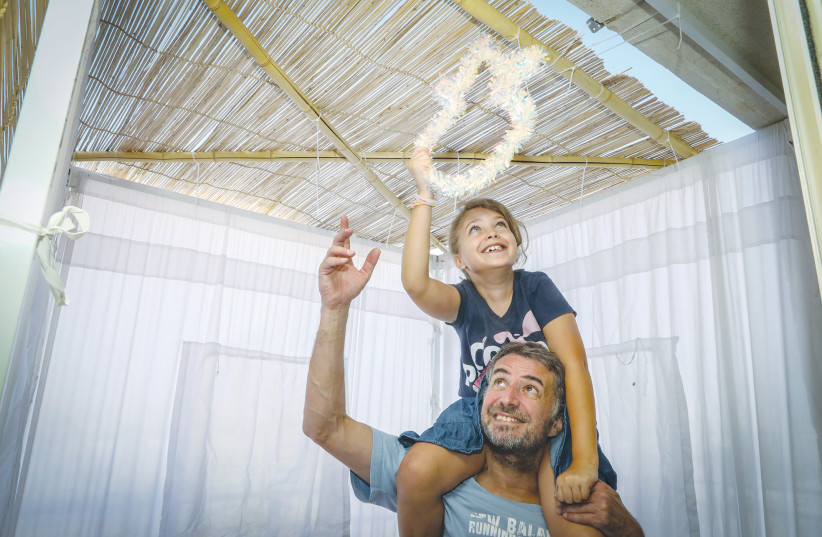Like so many of our Holy Days, Sukkot has both a seasonal/agricultural side and a historical/spiritual side.
In Deuteronomy. 16 (and similarly, in Exodus) we are told: “After the ingathering from your threshing floor and your vat, you shall hold the Feast of Booths for seven days.”
Indeed, our sukkah [booth] is very similar to the “booths” or shelters that to this day are erected in the fields for farm laborers and shepherds. Even those who do not grow their own food (far more of us today than in the past) are commanded to go outside and be aware just where our food comes from.
Similarly, we should take note that our fully-stocked larder – literal and figurative – are a gift and a privilege. Among the explanations of the mitzvah of sukkah is that of the Rashbam (the grandson of Rashi) who says: “Therefore, the people leave houses filled with good at the harvest season and they dwell in booths… so that a person’s heart should not grow haughty because of houses filled with everything good, lest they say: ‘Our hands made all of this wealth for us.’”(Deut. 8)
What is the historical/spiritual basis for Sukkot?
The historical/spiritual basis for the holiday is found in Lev. 23: “You shall live in booths seven days; all citizens in Israel shall live in sukkot. In order that future generations may know that I housed the Israelite people in booths when I brought them out of the land of Egypt.”

Famously, these verses lead to the Talmudic disagreement (Sukkah 11b), whether the sukkot in which the Israelites were housed were actual booths, or “clouds of glory.”
It might seem a strange argument – until we notice that nowhere at all in the rather lengthy descriptions of the children of Israel’s wanderings in the desert are we told that they dwelled in booths. There are lots of mentions of tents, but no sukkot at all! Of course, we’re also not told that they were housed in clouds, but divine clouds are certainly about, guiding and protecting. The Mekhilta d’Rabbi Yishmael describes it like this: “Seven clouds: four on four sides, one above, one below, and one going before them, lifting what was low, and lowering what was high.”
To my way of thinking, this image doesn’t entirely fit the stories of complaints, fights and difficulties in the desert years – and it also seems rather claustrophobic, taking away the people’s initiative and independence, closing them off entirely from their surroundings. On the other hand, perhaps the newly-free slaves of Egypt needed this type of all-encompassing protection, and perhaps this vision of the divine sukkah inspires the desire to make our sukkot beautiful, comfortable and embracing.
These three different takes on the meaning of the sukkah can help us connect to three different aspects of God – as provider of spiritual and actual food, guide as we journey through our lives, and protector. We can also try to emulate these divine qualities, and to devote ourselves to being givers, supporters and helpers.
In doing so, we should consider those for whom each of these types of “booth” is not just a temporary or holiday dwelling.
Let’s think about the agricultural workers, often underpaid and ill-housed, and indeed all those who help produce our food and our other goods, without being able to afford these things for themselves. What actions can we take to ensure fair payment and conditions for workers?
Let’s think about those who truly live in tents and shacks, and those who have no permanent home, or whose homes are vulnerable due to war, discrimination or natural disasters. What organizations and policies can we support to ensure fulfillment of that most basic right to a roof over their heads?
Let’s think also about those who are trapped on all sides, who cannot see through the clouds of hatred or of lies – those who are still closed in a closet, ensnared in cults, in human trafficking, in marriages that have become prisons instead of homes. How can we enable them to find a way out, to a place where they can see the stars?
Because beyond the temporary booth of the holiday, there’s another sukkah, one that we pray for daily and which, if we could only make it real, would be with us for good. That is the sukkat shalom – the sukkah/shelter of peace. It is a place where all can find nourishment and rest.
Its walls do not block out the voices of our neighbors. Its roof does not cut us off from nature in all its beauty. It’s somewhat flimsy – we need to take care of it and maintain it well. When we sit out in our sukkot this year, may we dedicate ourselves to building this sukkah, and widening it to encompass us all.
Rabbi Ma’ayan Turner is from New Zealand, ordained by the Israeli Reform Movement, and works for a human rights NGO.
